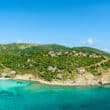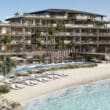Gulf Land Structures’ Josh Vice on Modular Construction in the Caribbean
Whether there’s a significant storm and it’s time to rebuild, or a developer is trying to build on a remote Caribbean location, there’s one essential need that isn’t easy to find: housing for the workforce. Since 2007, Gulf Land Structures has been at the forefront of the modular construction industry, providing solutions for every type of situation from far-off island cruise port development to housing for disaster relief services. To learn more, Caribbean Journal Invest caught up with Josh Vice, vice president/partner at Gulf Land Structures.
Tell us what it is your company does.
We specialize in design, constructing, rental and servicing of fiberglass and steel modular buildings for applications requiring USCG, ABS, SOLAS, API, NFPA, ASCC, IBC and IMO regulatory approvals. Our management team and technical staff have over 130 years of experience in the modular living quarters’ and temporary housing industry. Gulf Land’s customers have come to trust and respect the flexibility and innovative approach from our experienced engineering and design teams.
How long have you been doing this and where did you get your start?
Gulf Land was founded in 2007 with a fleet of modular living quarters targeting the US offshore oil & gas market. From there it made sense to offer additional services for our clients such as refurbishing their existing permanent buildings as well as fabricating custom units for their design build needs.
Tell us about your Caribbean projects.
The energy industry is very cyclical, so began looking for other industries where we could offer our same services to offset the cycles of the energy sector. In early 2017 we were contacted by a large international construction company who was in the planning stages of a cruise destination project on a remote island in the Bahamas. The island had no existing infrastructure to house a workforce of 500 personnel and the nearest hotel was a couple hour boat ride away. Our modules are perfect for this scenario because they can be individually shipped to any location by land or sea and then set up as a 100% self-contained camp meaning we can provide our own power and water. We secured the project and began shipping the modules in June of 2018, successfully housing 500 workers for nearly 18 months until the project was complete.
The same client had a similar project in St. Maarten where they were refurbishing an existing resort that was damaged by Hurricane Irma. Since the local hotels were still out of service in the fall of 2018, we had another scenario where Gulf Land was able to provide a solution in order for our client to house nearly 300 workers on site in order to perform their project. This particular project posed unique challenges that we were able to successfully overcome. For this particular project the client had limited area to place the camp, but fortunately our modules are stackable and we were able to fit the camp in the area the client had designated. In addition to limited area at the site the roads in St Maarten can be quite narrow and the traffic bad at times. To get the modules from seaport to the job site was at times difficult. To solve this problem, we partnered with a local heavy load trucking company that was well versed in moving large items around St. Maarten. This was a win for us while at the same time being able to provide work for some of the locals. This project is currently ongoing and expected to be complete sometime this summer.
On the disaster relief side after Hurricane Irma we quickly sent assets and equipment to Puerto Rico where Gulf Land rental buildings housed workers to get that island back up and running.
After a disaster, how fast can you set up temporary housing?
Camp set up all depends on the size /scope geographic location. We can typically mobilize immediately after a storm or disaster and be set up in a matter of days. For instance, after Hurricane Harvey in Houston we were able to mobilize and set up a 200-bed camp in just 7 days. For a 500-bed camp such as Bahamas it would take 3 to4 days to transport the buildings to location and about 2 weeks to set up. Generally, speaking, this is very quick deployment where you could be set up and providing relief services in any location or island in a matter of days.
What does this kind of housing entail? What is its scale and scope?
The housing modules can vary broadly depending on what the need is. Unlike shipping containers, the typical sleeping module is 11’ wide x 36’ long and can sleep up to 12 people with 2 showers, 2 toilets, 2 vanity sinks. For longer duration project, some customers choose to limit the amount of beds in a module to allow personnel more space and comfort. The modules can also be set up as offices for management as well as cooking or laundry facilities. The scope is determined in engineering and planning, and we assist our clients in determining the most cost-effective way to set a camp up while never losing focus on comfort and safety. We have an inhouse engineering and design team that can provide site plans and drawings which helps the client to visualize what to expect.
What do you see as the future for this type of construction?
One of the big benefits of using the type of modules we offer is safety. Our modules are designed to withstand 180 mph wind load. The Caribbean can sometimes be prone to high winds and storms. Our modules are designed and constructed for these types of environments. We feel the future and the need for this type of protection is promising.
Are there certain kinds of sites in the Caribbean that necessitate these kinds of facilities the most?
Yes. We have learned based on past project experience and what we see going forward any development in a remote location where the existing infrastructure is limited, we are uniquely positioned to provide our solution. Even if you have access to hotels to house your workforce, our modules can usually be provided at a fraction of the cost. If the existing infrastructure is disabled, we can typically provide a solution that is both timely and cost effective.
What kinds of projects are well suited for this?
Any projects that require temporary housing.
What other kinds of construction work does Gulf Land do?
Since we already employ the workforce required to construct our own assets Gulf Land can also provide personnel to support most building construction projects. We employee carpenters, electricians, HVAC technicians, and plumbers which are all trades typically utilized in building construction. In addition to providing personnel we also build custom buildings for clients in our fabrication facility in Lafayette Louisiana. We recently submitted pricing for a blast rated building for a rum factory in St. Croix, along with modular beach houses for another project in Bahamas.
What do you see as your company’s future in the Caribbean region?
As anyone who reads the Caribbean Journal sees the Caribbean is a hot market for development. A lot of the development is in remote locations where Gulf Land Structures is uniquely positioned to provide a solution. We have the project experience and our assets are a lot of times strategically located in these areas. For every problem there is a solution and that is where Gulf Land comes in. We can a offer a customer a solution to their housing needs while the client focuses on the overall development portion of a project. As we all know the Caribbean is prone to storms so in this unfortunate event, we can often provide the same solution in order to get existing infrastructure back up and running.
For more, visit Gulf Land Structures.
— CJI


